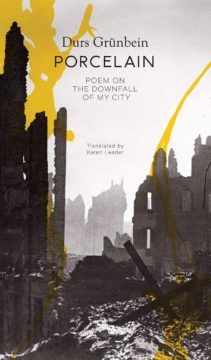Alexander Wells at the LARB:
 IN A NABOKOV short story from 1945, some cultured English people hobnob about the Dresden bombing at a cocktail party: “‘My Dresden no longer exists,’ said Mrs. Mulberry. ‘Our bombs have destroyed it and everything it meant.’” For Anglo-Americans since World War II, Dresden has become an icon of ruin, first moral then physical — a sensational reminder of the evils of war. Recent histories like Sinclair McKay’s Dresden (2020) tend to conjure the firestorm as an act of sheer destruction, a brutish assault on a culture city that, if you squinted, was comparable to Vienna or Paris. (Such accounts tend to overstate Dresden’s innocence — the city was an important site for industry and transportation.) Heavily bombed during the war, then only haltingly rebuilt by Communist East Germany (GDR), Dresden is now a global symbol for atrocity against the run of play.
IN A NABOKOV short story from 1945, some cultured English people hobnob about the Dresden bombing at a cocktail party: “‘My Dresden no longer exists,’ said Mrs. Mulberry. ‘Our bombs have destroyed it and everything it meant.’” For Anglo-Americans since World War II, Dresden has become an icon of ruin, first moral then physical — a sensational reminder of the evils of war. Recent histories like Sinclair McKay’s Dresden (2020) tend to conjure the firestorm as an act of sheer destruction, a brutish assault on a culture city that, if you squinted, was comparable to Vienna or Paris. (Such accounts tend to overstate Dresden’s innocence — the city was an important site for industry and transportation.) Heavily bombed during the war, then only haltingly rebuilt by Communist East Germany (GDR), Dresden is now a global symbol for atrocity against the run of play.
For contemporary Germans — and for Dresdeners in particular — it is far harder to talk constructively about the bombing. German wartime suffering remains a thorny moral question, especially for authors like Durs Grünbein, whose poetry collection Porcelain: Poem on the Downfall of My City, originally published in German in 2005, has been translated by Karen Leeder and released roughly to coincide with the 75th anniversary of the bombings.
more here.
